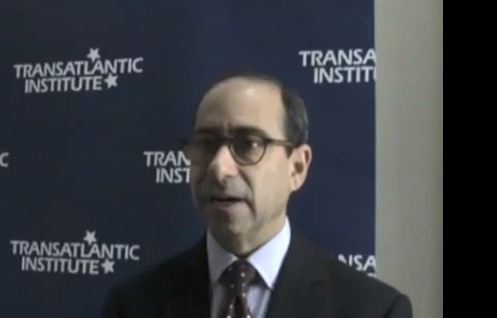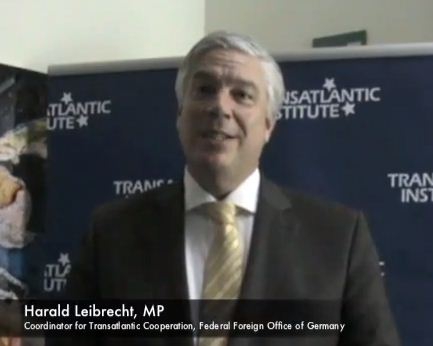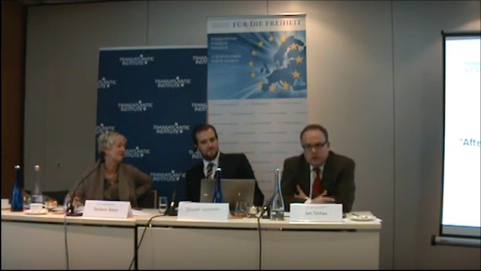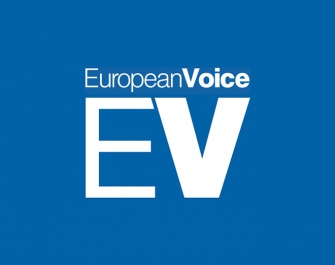Analysis
AJC CEO Tells Leading Greek Media: Trajectory in Greek-U.S. Ties “Steadily Upward”
Trajectory in Greek-US ties ‘steadily upward’
July 5, 2021
In Washington, Greece is viewed increasingly as an “important, reliable and steadfast” US partner and accordingly is at the center of every geostrategic doctrine which involves the Eastern Mediterranean and the Balkans, American Jewish Committee (AJC) CEO David Harris tells Kathimerini in an interview ahead of a visit to Athens during which he will meet with Greek political leaders and attend The Economist conference.
Harris backs the expanded framework of regional cooperation where Egypt, the United Arab Emirates and several other Arab countries are being integrated into the existing trilateral scheme comprising Greece, Israel and Cyprus.
The AJC CEO says that Greece’s image in the US has radically changed over the past decade and recalls how Mitt Romney, the 2012 Republican candidate for president, brought Greece up as a metaphor for a declining country. “Today, such a metaphor would be unthinkable, insofar as Greece has made a remarkable recovery, is attracting the interest of foreign investors, and has shown impressive political stability,” he says.
Furthermore, Harris says that Washington is moving closer to contributing to Cyprus’ military strength while slamming a two-state solution, now favored by Turkey, as a “disaster” for it would “create an Ankara-controlled nation outside the borders of Turkey.”
Speaking of Recep Tayyip Erdogan, Harris says that the Turkish president’s support for extremist groups and his vision “to lead the Islamist, not Islamic, world… is a source of immense concern to many.”
Harris, a strong advocate of Greek-Israeli ties for decades, appears keen on the “natural synergy” between the two states; however, he admits that there are probably “some limits” to the extent that Greece can count on Israel in a tough situation.
Finally, he laments the surge of anti-Semitism in many parts of the world, adding that Greece is not immune to the phenomenon. The experience of Golden Dawn, Harris says, serves as a painful reminder that “fascism and neo-Nazism are not entirely dead and buried.”
How do you assess the present state and future prospects of bilateral relations between Greece and Israel?
I’m bullish both on the current state and future potential of Greek-Israeli bilateral relations. There is a natural synergy between the two countries, many overlapping interests, and a foundation of shared democratic values. Moreover, on the people-to-people level, the more Greeks and Israelis get to know each other through tourism and other points of contact, the more they realize how much they have in common.
To what extent can Greece count on Israel’s support in a difficult situation?
I have no doubt that, on the aspirational level, both countries would wish to help the other in any tough situation, but, on a practical level, my guess – and here I am an outsider – is that there are likely some limits in both directions.
The Eastern Mediterranean Security and Energy Partnership Act is now being followed by the US-Greece Defense and Interparliamentary Partnership Act. Is Greece becoming an integral part of US strategy in the East Med and the Balkans?
Yes. The trajectory in Greek-US ties is steadily upward. In Washington, Greece is increasingly viewed as an important, reliable and steadfast partner of the United States. And no matter how much attention is paid to the “pivot” to Asia, there will always be strong American interests in both the East Med and the Balkans, putting Athens at the center of any geostrategic doctrine. Apropos, a big shout-out to US Ambassador Geoffrey Pyatt, who has been one of the driving forces in this American reorientation.
How important is the trilateral cooperation of Greece, Cyprus and Israel for regional stability, and what is the added value, if any, of the 3+1 scheme for the US?
The Athens-Nicosia-Jerusalem triangle has become a veritable anchor of cooperation, security and stability in the region. That’s only becoming still more apparent with each passing day. And American Jewish Committee (AJC) has long believed that it’s in America’s fundamental interest to encourage, support and participate in this prospering initiative.
How different is the image of Greece in the eyes of the American Jewish community compared to, say, a decade ago?
It’s fair to say that the image of Greece in America as a whole has radically changed in the last decade, and for the better. Remember in the 2012 presidential campaign, for example, how Mitt Romney, the Republican candidate, used Greece as a metaphor for a weakening economy and declining country. Today, such a metaphor would be unthinkable, insofar as Greece has made a remarkable recovery, is attracting the interest of foreign investors, and has shown impressive political stability. American Jews, no doubt, see that same evolving image of Greece as other Americans do, and surely like what they see.
What is your view of Greece’s developing ever closer cooperation with other regional players, such as Egypt and the United Arab Emirates?
This pathway potentially offers an important step forward in a direction long advocated by AJC. Specifically, we can now see three possible overlapping circles of nations. First, we have Greece, Cyprus and Israel. Second, we have the six Arab countries that are now part of the peace camp with Israel – Bahrain, Egypt, Jordan, Morocco, Sudan and the UAE. And third, we have several other nations in the Balkans eyeing with growing interest the possibility to engage with these other two groups. Eventually, putting it all together, there could be a formidable bloc of states in the Balkans, East Med, Middle East and North Africa committed to creating enhanced interstate cooperation and prosperity.
Cyprus and Erdogan
Turkish President Recep Tayyip Erdogan wants a “two-state” solution in Cyprus. How do you view such a prospect and what would it mean for Israel?
Most important here is what it would mean for Cyprus, and the answer, I believe, would be a disaster. The reasons are many and obvious, among them the fact that a permanent division of the island would undermine the concept of the island’s sovereignty and instead create an Ankara-controlled nation outside the borders of Turkey.
Should the US contribute to Cyprus’ military strength?
That’s clearly the direction in which we’re headed, underscored by the enactment of the Eastern Mediterranean Partnership Act, legislation that AJC enthusiastically supported.
Does the Turkish president’s support of the Muslim Brotherhood and Hamas worry you? And do you think it will continue and after Erdogan?
It’s impossible to predict today what might follow Erdogan’s authoritarian rule, but of course his support for the Muslim Brotherhood and its member-groups, including Hamas, is a source of immense concern to many. It fits in seamlessly with Erdogan’s aim to be at the center of power in the region and to lead the Islamist, not Islamic, world.
Αnti-Semitism
Regarding anti-Semitism in Greece, would you say the situation has improved compared to the past, and what is happening in other countries?
Painfully, anti-Semitism is surging in many places, including the United States. Greece has not been immune to acts of hatred against Jews. The very fact of the Golden Dawn Party has been a sobering reminder that fascism and neo-Nazism are not entirely dead and buried, even as the party’s political fortune has been in steady decline. In addition, the periodic desecrations of Holocaust monuments in Athens, Thessaloniki and elsewhere are, in a way, an attempt to murder Jews a second time. Given the immense suffering of Greece during the Nazi occupation, as well as the valiant resistance movement against German forces, Greece should be the last country to witness any effort to “normalize” Nazi-like acts, whether by a political party or by individuals. AJC has long stood in shoulder-to-shoulder solidarity with the Jewish Community of Greece, who are the survivors and their offspring of the nearly successful German attempt to extinguish all Jewish life in Greece during the war.




